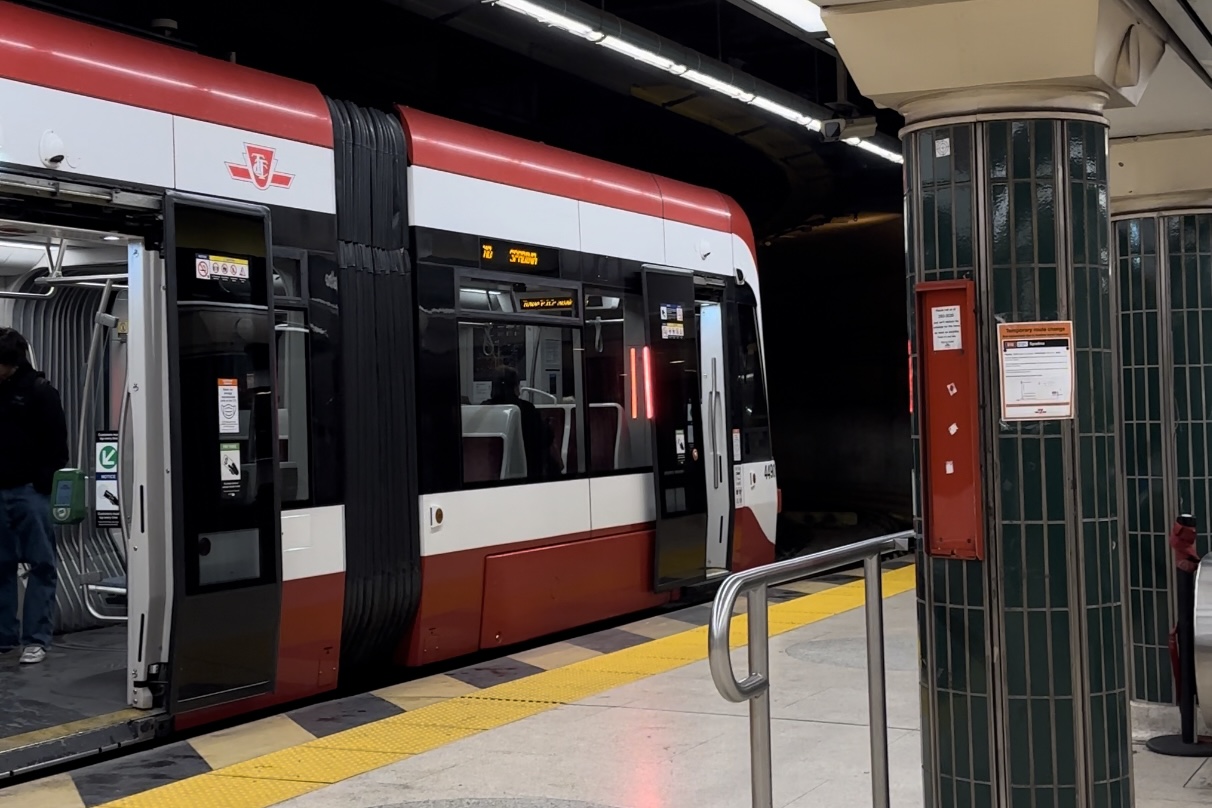
Listen to the whole story:
The One Fare Program will come into effect at the end of the month, significantly reducing transportation expenses for many GTA commuters, including Toronto Metropolitan University (TMU) students. Starting Feb. 26, this Ontario government program will allow travellers to transfer between numerous public transportation systems across the Greater Toronto and Hamilton Area (GTHA) with just one fare.
“Ever since the announcement of this program, I’ve really been hoping it could come to fruition a lot sooner because [commuting] doesn’t just take a toll on my physical well-being, it takes a toll on my wallet and it takes a toll on the wallets of a lot of students that go to university,” Ana Saplala said.
Saplala, a fourth-year media production student from Ajax, makes three changes on her commute to school. Beginning with Durham Transit, she switches to GO Transit and ends by taking the TTC to complete her 70-minute journey, three days a week.
Using her PRESTO card, Saplala spends $3.35 on the local bus, $8.58 on GO Transit and $3.35 on the TTC. Considering her commute to and from school, this amounts to $30.56 a day and $91.68 a week.
With the One Fare Program, Saplala could only have to pay the $8.58 GO Transit fare for her one-way commute, spending $17.16 per day and $51.48 per week. This could save her $13.40 a day and $40.20 a week, or 56 per cent.
She said she is exhausted by the process and by spending nearly $100 per week on her commute.
“This program will help me worry less about how much money I have to take out of my account at the end of every week to reload my card,” Saplala said.
The TTC single adult fare stands at $3.35 while the GO Transit fare to Union Station can range from $3.70 to $19.40 each way, depending on the distance.
The One Fare Program includes travel via GO Transit, Toronto Transit Commission (TTC), York Regional Transit (YRT), Brampton Transit, Durham Region Transit and MiWay of Mississauga.
Saplala’s sentiment is echoed by third-year professional communications student, Adriana Forestieri, who commutes four days a week from Markham. Her trips to campus begin with GO Transit and end with the TTC.
She spends $5.64 on the GO with her PRESTO youth discount and $3.35 on the TTC. This adds up to $17.98 a day, to and from school, and $71.92 a week.
This new program could reduce Forestieri’s weekly transit spending by 37.26 per cent, which translates to $11.28 a day or $45.12 a week.
The cost of transportation even discourages Forestieri from attending classes on campus or engaging in social activities, but she’s hoping this program will change things.
“I’ll be saving half the price I pay a week and it’ll definitely motivate me more to go into my in-person classes,” she said. “I won’t have to worry about compromising my social life for school or vice versa, anymore.”
“Our research findings suggest that many of our students consider commuting as a significant barrier to participate in activities at the university,” said associate professor of urban regional planning at TMU, Raktim Mitra. “My hope is that policies such as this one would remove some of the barriers for our students in terms of anticipating education and activities on campus.”
Building upon Mitra’s observations, Saplala elaborates on the practical implications of transit affordability for students. “I feel like I’m restricted to mostly working on campus, which sucks, because I can’t use all the functions of a university. I think public transit, especially with students that go to commuter schools, really dictates what a student can do outside of academics. I think it dictates the decisions they want to make, or in this case have to make,” she shared.
Overall, Mitra said he believes that this initiative will greatly benefit the student population.
“This policy will have significant positive impact given that more than half of our students commute from municipalities outside of the city and about a quarter of our students rely on GO Transit to get to and from campus,” he said.
“We want to make sure that we don’t pay big fare penalties when we cross city boundaries because people’s journeys don’t necessarily end at the border of Toronto, they go beyond,” said August Pantitlán Paranauth. Puranauth works as a community planner at TTC Riders, a grassroots organization focused on fighting for better transit in Toronto.
Reflecting on past delays in fare integration, Puranauth has called this program “a long time coming.”
“Even though we’re getting a discount when we transfer from the GO to the TTC, the issue is that GO fares are not exactly one single fare in Toronto,” said Puranauth. “One of the key asks we have is to make a single unified fare here in Toronto to make transit more accessible and affordable in the future.”
With this program, Saplala hopes to see further improvements to public transportation throughout the region.
“I hope that the program brings attention to the efficiency of the transit itself, and not just the fare,” she said. “I hope that it changes regional transit in a way that not only makes Toronto Transit more integrated, but represents the expansive network of Toronto and greater Toronto regional transit.”
Reporter, On The Record, Winter 2024.

